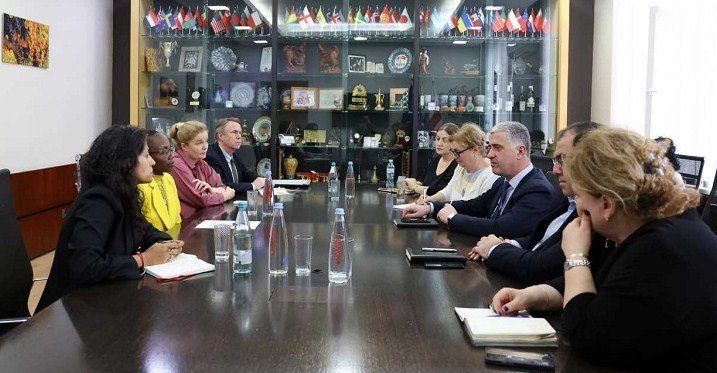World Bank Supports Georgia’s COVID-19 Response
The World Bank Regional Director for the South Caucasus, Sebastian Molineus, visited Georgia on March 4-5, 2024, to meet with the country’s authorities and discuss the World Bank’s ongoing and planned support for Georgia’s economic recovery from the COVID-19 pandemic.
During his visit, Molineus met with the Prime Minister of Georgia, Irakli Garibashvili, the Minister of Finance, Lasha Khutsishvili, the Minister of Economy and Sustainable Development, Natia Turnava, and other high-level officials.
Molineus praised Georgia’s swift and effective response to the health crisis, which helped contain the spread of the virus and save lives. He also commended the government’s efforts to mitigate the social and economic impact of the pandemic, especially on the most vulnerable groups.
The World Bank has been a key partner for Georgia in its COVID-19 response, providing $1.5 billion in financial and technical assistance since the outbreak of the pandemic. This includes $80 million for the purchase and deployment of COVID-19 vaccines, which are expected to arrive in the country in the coming weeks.

Otar Shamugia Highlights Georgia’s Economic Potential
One of the meetings that Molineus had during his visit was with the Deputy Minister of Economy and Sustainable Development, Otar Shamugia, who is also the head of the Georgian delegation to the World Bank.
Shamugia and Molineus discussed the current economic situation in Georgia, the challenges and opportunities for growth, and the priorities for the World Bank’s future cooperation with the country.
Shamugia emphasized Georgia’s economic potential and resilience, despite the unprecedented shock caused by the pandemic. He said that Georgia has a strong track record of implementing structural reforms, improving the business environment, and attracting foreign direct investment.
He also highlighted the government’s vision for a green and inclusive recovery, which aims to create more jobs, reduce poverty, and protect the environment. He expressed his appreciation for the World Bank’s support for Georgia’s development agenda, especially in the areas of infrastructure, energy, agriculture, education, and social protection.
Molineus reaffirmed the World Bank’s commitment to continue supporting Georgia’s economic recovery and long-term development goals. He said that the World Bank is ready to provide more financing and knowledge to help Georgia overcome the crisis and achieve its potential.
He also praised Shamugia’s leadership and expertise, and said that he looks forward to working with him and his team in the future.
Georgia and the World Bank: A Strong Partnership
Georgia joined the World Bank in 1992, shortly after gaining its independence from the Soviet Union. Since then, the World Bank has provided more than $4.1 billion in financial assistance to Georgia, including loans, grants, and guarantees.
The World Bank’s current portfolio in Georgia consists of 12 active projects, with a total commitment of $1.3 billion. These projects support Georgia’s development priorities in various sectors, such as transport, water, energy, social protection, health, education, and public financial management.
The World Bank also provides analytical and advisory services to Georgia, to help the government design and implement evidence-based policies and reforms. Some of the recent studies that the World Bank has conducted or supported in Georgia include the Systematic Country Diagnostic, the Country Economic Memorandum, the Poverty Assessment, and the Climate Change Policy Assessment.
The World Bank works closely with other development partners in Georgia, such as the International Monetary Fund, the European Union, the Asian Development Bank, and the United States Agency for International Development. The World Bank also engages with civil society, private sector, academia, and media, to foster dialogue and collaboration on development issues.
The World Bank’s partnership with Georgia is guided by the Country Partnership Framework for 2019-2022, which was developed in consultation with the government and other stakeholders. The framework outlines the World Bank’s strategic objectives and areas of intervention in Georgia, based on the country’s development needs and priorities.
The framework focuses on three main pillars: enhancing public service delivery and economic opportunities for all; building resilience to economic and environmental shocks; and investing in human capital and empowering citizens.
